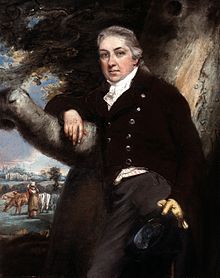Edward Jenner | |
|---|---|
 | |
| Born | 17 May 1749 Berkeley, Gloucestershire, England |
| Died | 26 January 1823 (aged 73) Berkeley, Gloucestershire, England |
| Alma mater | |
| Known for | |
| Spouse |
Catherine Kingscote
(m. 1788; died 1815) |
| Children | 3 |
| Scientific career | |
| Fields | Medicine/surgery, natural history |
| Academic advisors | John Hunter |
Edward Jenner FRS FRCPE[1] (17 May 1749 – 26 January 1823) was an English physician and scientist who pioneered the concept of vaccines and created the smallpox vaccine, the world's first vaccine.[2][3] The terms vaccine and vaccination are derived from Variolae vaccinae ('pustules of the cow'), the term devised by Jenner to denote cowpox. He used it in 1798 in the title of his Inquiry into the Variolae vaccinae known as the Cow Pox, in which he described the protective effect of cowpox against smallpox.[4]
In the West, Jenner is often called "the father of immunology",[5] and his work is said to have saved "more lives than any other man".[6]: 100 [7] In Jenner's time, smallpox killed around 10% of the global population, with the number as high as 20% in towns and cities where infection spread more easily.[7] In 1821, he was appointed physician to King George IV, and was also made mayor of Berkeley and justice of the peace. He was a member of the Royal Society. In the field of zoology, he was among the first modern scholars to describe the brood parasitism of the cuckoo (Aristotle also noted this behaviour in his History of Animals). In 2002, Jenner was named in the BBC's list of the 100 Greatest Britons.
- ^ "Jenner, Edward (1749–1823)". rcpe.ac.uk. Royal College of Physicians of Edinburgh. 28 January 2015. Archived from the original on 12 May 2021. Retrieved 26 June 2018.
- ^ Riedel S (January 2005). "Edward Jenner and the history of smallpox and vaccination". Proceedings (Baylor University. Medical Center). 18 (1). Baylor University Medical Center: 21–25. doi:10.1080/08998280.2005.11928028. PMC 1200696. PMID 16200144.
- ^ Baxby D (2009) [2004]. "Jenner, Edward (1749–1823)". Oxford Dictionary of National Biography (online ed.). Oxford University Press. doi:10.1093/ref:odnb/14749. Retrieved 2 December 2022.
- ^ Baxby D (1999). "Edward Jenner's Inquiry; a bicentenary analysis". Vaccine. 17 (4): 301–307. doi:10.1016/s0264-410x(98)00207-2. PMID 9987167.
- ^ Cite error: The named reference
JennerBBCwas invoked but never defined (see the help page). - ^ Cite error: The named reference
Baron1838_vol2was invoked but never defined (see the help page). - ^ a b "How did Edward Jenner test his smallpox vaccine?". The Telegraph. Telegraph Media Group. 13 May 2016. Archived from the original on 26 January 2022. Retrieved 2 December 2017.